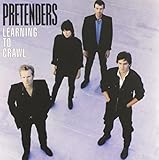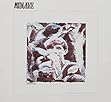This could be you
The music world is now almost a decade removed from the pop-punk, “alternative”, and mainstream grunge of the ’90s. With that in mind, Virginia outfit No Compromise adds a healthy dose of nostalgia to both their live shows and their latest release, This Could Be You.
No Compromise is a classic rock band, in the loosest sense of the phrase. This Could Be You builds on that reputation, compressing the best of ’90s rock into seven tracks, while still managing to sound fresh. Standout track “Whatever It Takes” is full-on 1994/95-era Foo Fighters with scalpel-sharp guitar work from Jack Kwait-Blank and enough energy to tide them over for the rest of the album. Lead single “Love, Myself” is catchy and works in part because of a two-part harmony that pops up in a couple of places. Additionally, listen for it in the chorus of last year’s “Seams So Seamless”. It sounds appealing, but is vastly underutilized.
 Their overall sound is pleasing. Think of a downtuned, grungier Jimmy Eat World without Auto-Tune, circa 2000. Altogether radio-friendly, the band takes another step forward, production-wise, with keyboards on “Rain Over Washington” and “The Only One Left” and subtle vocal effects (and perhaps double-tracking?) on the plodding “Cybernoia”. In the right hands, the track “Restless” could have hypothetically devolved into an all-out hardcore grungefest the likes of which Korn has never heard. If NoCo gets picked up by a label, I wouldn’t be surprised if “Restless” gets a makeover.
Their overall sound is pleasing. Think of a downtuned, grungier Jimmy Eat World without Auto-Tune, circa 2000. Altogether radio-friendly, the band takes another step forward, production-wise, with keyboards on “Rain Over Washington” and “The Only One Left” and subtle vocal effects (and perhaps double-tracking?) on the plodding “Cybernoia”. In the right hands, the track “Restless” could have hypothetically devolved into an all-out hardcore grungefest the likes of which Korn has never heard. If NoCo gets picked up by a label, I wouldn’t be surprised if “Restless” gets a makeover.
No Compromise played the State Theatre in Falls Church, VA last night and the relatively high quality of the venue’s PA system really “opened up” NoCo’s sound, as if a layer of dust had been squeegeed off. The trio fit in quite nicely alongside unsigned group Redshift and established local band The Blackjacks. Again, Jack Kwait-Blank’s versatile guitar work anchored the performance — at times channeling Billy Corgan, at other times even Dave Grohl or Al Pitrelli — sometimes all within the same song. William Bowen pounded the drums with a style that, for some reason, reminded me of Slowhand. The sticks appeared to be hitting the skins just in the nick of time. Thrilling to watch, to say the least. Bassist and lead singer Justin Fry was energetic and employed fuzz effects at times, essentially playing rhythm during Kwait-Blank’s solos. Or perhaps it was just my imagination.

 Just when I thought it was safe to eat healthy again, Annie goes to the store and brings back two large containers of ice cream, at least two packages of Pepperidge Farm cookies, a dozen doughnuts, tea cookies, chocolate chip cookies, brownies (with sprinkles), spicy hot potato chips, Boboli pizza dough, two four-packs of Starbucks Frappuccinos, and Lord knows what else. Add to that my new affinity toward Dagoba dark chocolate and Jif peanut butter — and Annie’s propensity toward putting those bite-size chocolate morsels and Reese’s peanut butter cups in little bowls in the living room — it’s a wonder that my body hasn’t completely gone to seed.
Just when I thought it was safe to eat healthy again, Annie goes to the store and brings back two large containers of ice cream, at least two packages of Pepperidge Farm cookies, a dozen doughnuts, tea cookies, chocolate chip cookies, brownies (with sprinkles), spicy hot potato chips, Boboli pizza dough, two four-packs of Starbucks Frappuccinos, and Lord knows what else. Add to that my new affinity toward Dagoba dark chocolate and Jif peanut butter — and Annie’s propensity toward putting those bite-size chocolate morsels and Reese’s peanut butter cups in little bowls in the living room — it’s a wonder that my body hasn’t completely gone to seed.
 I have a comment about the design of the yogurt container. There is no mention that the yogurt must be stirred. I ate about 3/4 of a yogurt before I realized that there was a huge dollop of chocolate at the bottom. Before I discovered the chocolate, I was thinking, “..my, what a bland yogurt!” Perhaps I was just having an off-day.
I have a comment about the design of the yogurt container. There is no mention that the yogurt must be stirred. I ate about 3/4 of a yogurt before I realized that there was a huge dollop of chocolate at the bottom. Before I discovered the chocolate, I was thinking, “..my, what a bland yogurt!” Perhaps I was just having an off-day.

 I’ve told Annie that I love her more with each passing day. While on the surface, that may sound mushy and trite, but there’s actually some truth behind the statement. But the question remains: is this increase in love quantifiable? Would a graphical representation be adequate in estimating the inestimable?
I’ve told Annie that I love her more with each passing day. While on the surface, that may sound mushy and trite, but there’s actually some truth behind the statement. But the question remains: is this increase in love quantifiable? Would a graphical representation be adequate in estimating the inestimable?







